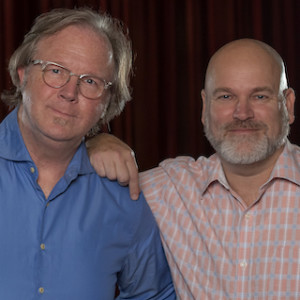
Stories, science and secrets from the world’s brightest thought-leaders. Behavioral Grooves is the podcast that satisfies your curiosity of why we do what we do. Explanations of human behavior that will improve your relationships, your wellbeing, and your organization by helping you find your groove.
Episodes

Monday Sep 09, 2019
Announcements: Minneapolis and Philadelphia Events
Monday Sep 09, 2019
Monday Sep 09, 2019
Groovers, a couple of announcements for you:
1. Kurt and I are hosting a meetup immediately after Customer Focus North in Minneapolis on September 19, 2019: https://www.customerfn.com/. Rodd Wagner will be speaking! Make sure you use this code to get 10% Off your registration to Customer Focus North: BEHAVIORAL
2. We're celebrating our 100th Episode and want you to join us in Philadelphia at the live event. Annie Duke will be onstage for our discussion! The link for the 100th Episode Meetup in Philadelphia on October 17, 2019: https://www.meetup.com/Philadelphia-Behavioral-Science-Meetup-Group/

Sunday Sep 08, 2019
Christian Hunt: Mitigating Human Risk and The Algorithmic Mind
Sunday Sep 08, 2019
Sunday Sep 08, 2019
Christian Hunt is the founder of Human Risk, a Behavioral Science Consulting and Training firm specializing in the fields of Risk, Compliance, Conduct & Culture. Before this, he was the head of Behavioral Science at UBS and before that, Chief Operating Officer of the Prudential Regulation Authority, a subsidiary of the Bank of England responsible for regulating Financial Services.
Christian shared his 5 principles of human risk – myths that humans cling to that don’t help us do what we ought to be doing. They are all founded on the notion that very few people are doing things they shouldn’t be doing – and yet most of the rules in corporate culture are created to prevent, rather than uplift. And Christian’s biggest beef is that many, many people are NOT doing the things they SHOULD be doing – again, in part because of context and culture.
We encountered some internet gremlins that mucked up the portion of our discussion with Christian that was about music. Regrettably, we are unable to bring you Christian’s Top 10 Behavioral Science Hits but we promise to return to it in the future.
In our grooving session, we discuss the implications of the mental algorithms and what we can do about them. We hope you enjoy our conversation with Christian Hunt.
Links
Christian Hunt: https://www.linkedin.com/in/humanrisk/
Human Risk: https://www.linkedin.com/pulse/interested-behavioural-science-subscribe-now-human-risk-hunt/
Harley Davidson: https://www.harley-davidson.com/us/en/index.html
BMW Motorcycle: https://www.bmwmotorcycles.com/en/home.html#/filter-all
Royal Enfield: https://www.royalenfield.com/
“Predictably Irrational,” by Dan Ariely: http://danariely.com/books/predictably-irrational/
Franz Kafka: https://en.wikipedia.org/wiki/Franz_Kafka
Daniel Kahneman: https://en.wikipedia.org/wiki/Daniel_Kahneman
Prison Experiment: https://www.prisonexp.org/
Game of Thrones: https://en.wikipedia.org/wiki/Game_of_Thrones
Chernobyl (TV Show): https://en.wikipedia.org/wiki/Chernobyl_(miniseries)
Henrik Ibsen: https://en.wikipedia.org/wiki/Henrik_Ibsen
Somerset Maugham: https://en.wikipedia.org/wiki/W._Somerset_Maugham
Sinclair Lewis: https://en.wikipedia.org/wiki/Sinclair_Lewis
Inner Emigration: https://en.wikipedia.org/wiki/Inner_emigration
William Shakespeare: https://en.wikipedia.org/wiki/William_Shakespeare
Othello: https://en.wikipedia.org/wiki/Othello
“The Culture of Responsibility” Netflix: https://www.goodreads.com/en/book/show/36417234
“Shawshank Redemption,” by Stephen King: https://en.wikipedia.org/wiki/Rita_Hayworth_and_Shawshank_Redemption
Buckminster Fuller: https://www.bfi.org/about-fuller/biography
Kurt Nelson: @motivationguru
Tim Houlihan: @THoulihan
Check out the Behavioral Grooves website: https://behavioralgrooves.com/

Monday Sep 02, 2019
Brian Ahearn: Influencing People Ethically
Monday Sep 02, 2019
Monday Sep 02, 2019
Brian Ahearn is Behavioral Grooves’ first repeat guest. (He was first featured in Episode 39: The Heart of Reciprocity.) We recently reconnected with him to discuss his new book, Influence PEOPLE. The book explores the science behind the influence process – what drives people to take the actions you want them to take, without manipulation or trickery. The book is about changing people's behavior. Positive thoughts, and even agreement from others, only go so far – and seldom lead to a change in behavior. Our conversation with Brian focused on specific ways to make that happen.
Brian’s book is not intended as an academic replay of all the aspects of the science of persuasion. While the science is foundational, the book focuses on the practical aspects of application with lots of great examples and case studies, many of them from Brian’s personal experiences. We recommend you check it out if you’re uninterested in the science but care deeply for the “how-to” part of the story.
We also returned to music and revisited Brian’s eclectic playlists. We focused on his predilection to combine Frank Sinatra and Coldplay into a single “clean” playlist that he uses in client workshops and presentations.
In our grooving session, we discussed whether the tool can be held accountable or is it only the user of the tool? And are you familiar with the Wilhelm Scream? Listen in to find out.
For those of you listening before October 2019, Kurt and Tim will be celebrating our podcast’s 100th episode in Philadelphia at the Pennsylvania Academy of Performing Arts on October 17th. Our lead guest will be Annie Duke.
Links
Brian Ahearn: https://www.influenceatwork.com/about/trainers/brian-ahearn/
Influence PEOPLE: https://www.amazon.com/Influence-PEOPLE-Powerful-Everyday-Opportunities/dp/1733178503
Daniel Kahneman: https://en.wikipedia.org/wiki/Daniel_Kahneman
Robert Cialdini: https://en.wikipedia.org/wiki/Robert_Cialdini
Dan Ariely: https://en.wikipedia.org/wiki/Dan_Ariely
Ellen Langer study: https://www.psychologytoday.com/us/blog/brain-wise/201310/the-power-the-word-because-get-people-do-stuff
Record Store: https://en.wikipedia.org/wiki/Record_shop
Michael Kerrison: https://www.linkedin.com/in/mike-kerrison-760a778/
100th Episode Meetup in Philadelphia on October 17, 2019: https://www.meetup.com/Philadelphia-Behavioral-Science-Meetup-Group/
Kurt Nelson: @motivationguru
Tim Houlihan: @THoulihan
Check out the Behavioral Grooves website: https://behavioralgrooves.com/
Artists
Hamilton: https://www.youtube.com/watch?v=b5VqyCQV1Tg
Queen, Bohemian Rhapsody: https://www.youtube.com/watch?v=vsl3gBVO2k4
Frank Sinatra: https://en.wikipedia.org/wiki/Frank_Sinatra
Coldplay: https://en.wikipedia.org/wiki/Coldplay
Boston: https://en.wikipedia.org/wiki/Boston_(band)
Johnny Cash: https://en.wikipedia.org/wiki/Johnny_Cash

Sunday Aug 25, 2019
Alex Blau: The Implementation-Intention Framework
Sunday Aug 25, 2019
Sunday Aug 25, 2019
Alex Blau is a vice president at ideas42 with projects in consumer finance, design and decision-making, and international development. In our discussion, we focused on a new project he’s working on in the area of supervision of people after they're released from incarceration, or what we commonly refer to as parole.
The cost of incarceration and supervision is more than just social – it comes with a big price tag. Nearly $7 billion is spent annually to supervise individuals coming out of the prison system and another $9 billion is spent on incarceration. More than 4.5 million people in the United States are under supervision and government data indicate that roughly two-thirds of those released from prison will be arrested within 3 years.
Roughly 50% of the arrests are for rule violations (the other 50% for committing new crimes). Alex and his colleagues at ideas42 are researching ways to change the context of the world the parolees return to with the hope of reducing recidivism. We talked about the novel interventions they’re testing.
We also discussed a brief history of Jamaican music with an emphasis on the rich catalog of the island nation’s artists, emerging near the middle of the 20th century. In our grooving session, Kurt and Tim cover the implementation-intention framework and how reminders via association can be more powerful than specific triggers, especially when triggers are difficult to identify.
We hope you enjoy our discussion with Alex Blau.
Links
Alex Blau: https://www.linkedin.com/in/alexander-blau-2271788/
ideas42: https://www.ideas42.org/
Annie Duke: https://www.annieduke.com/
Todd Rogers & Katy Milkman “Reminders through Association” https://scholar.harvard.edu/files/todd_rogers/files/rogers_milkman_rta.pdf
Sendhil Mullainathan: https://en.wikipedia.org/wiki/Sendhil_Mullainathan
Laurie Santos, GI Joe Effect: https://www.youtube.com/watch?v=GimHHAID_P0
Reggae: https://en.wikipedia.org/wiki/Reggae
Ska: https://en.wikipedia.org/wiki/Ska
Rocksteady: https://en.wikipedia.org/wiki/Rocksteady
Mento: https://en.wikipedia.org/wiki/Mento
Fugue: https://en.wikipedia.org/wiki/Fugue
David Hussman episode #17: https://behavioralgrooves.com/episode/the-accidental-behavioral-scientist-with-david-hussman/
Kurt Nelson: @motivationguru
Tim Houlihan: @THoulihan
Check out the Behavioral Grooves website: https://behavioralgrooves.com/
Artists
Bob Marley: https://www.youtube.com/watch?v=RhJ0q7X3DLM
Desmond Decker: https://www.youtube.com/watch?v=mxtfdH3-TQ4
Toots and the Maytals: https://www.youtube.com/watch?v=5nqqp5XoyLE

Sunday Aug 18, 2019
Steven Sisler: Seeing People as We Are
Sunday Aug 18, 2019
Sunday Aug 18, 2019
Steven Sisler may not be a household name, but he should be. Steve is a Master Level Behavioral Profiler and the lead Behavioral Analyst at The Behavioral Resource Group. He consults on personality, career strategy, leadership strategy, culture, spiritual growth, relationship management, and temperament strategy.
We were introduced to Steve by one of our listeners and we were happy to invite him on the show. His wit and wisdom were both entertaining and rewarding in ways that only a guy who has held jobs as diverse as roofing a house to authoring seven books and speaking at conferences can be. Steve’s behavioral focus emerges from his work with personality assessments, and this brought a fresh perspective us as we rarely dive into the tools of the trade. We discussed the value of understanding who we are as individuals to help us better understand how others are. As Steve said, “We don’t see people as they are, we see people as we are.”
We hope you enjoy our conversation with Steve and we’ve shared links to many of the references – and there were many – for those unfamiliar with this field of study.
Links
Steven Sisler: https://behavioralresourcegroup.com/about-us/about-steve-sisler/
King Solomon (Ecclesiastes 9:11): https://quoteinvestigator.com/2015/06/04/race-swift/
Descriptive Self: https://positivepsychology.com/self-concept/
Normative Self: https://philarchive.org/archive/SILAAN-4
The Prince of Egypt (Disney): https://en.wikipedia.org/wiki/The_Prince_of_Egypt
Robert S. Hartman, PhD: http://www.athenaq.com/about-us/robert-s-hartman-phd/
Axiology: https://en.wikipedia.org/wiki/Axiology
Bad Players Make Great Coaches: https://www.thesportster.com/entertainment/top-15-horrible-athletes-who-made-great-coaches/
Turning into a Skid: https://www.youtube.com/watch?v=ONXHtODehHk
Dave Ramsey (radio host): https://www.daveramsey.com/
John G. Geier & Dorthey E. Downey, Aristos: http://www.geierlearning.com/aristos.html
DISC Assessment: https://www.123test.com/disc-personality-test/
Hyper Empathy: https://exploringyourmind.com/hyper-empathy-syndrome-much-good-thing/
Emotional Intelligence: https://www.psychologytoday.com/us/basics/emotional-intelligence
GI Joe Fallacy: https://www.youtube.com/watch?v=GimHHAID_P0
Mirroring: https://en.wikipedia.org/wiki/Mirroring_(psychology)
Pinky & The Brain: https://en.wikipedia.org/wiki/Pinky_and_the_Brain
“Quiet” by Susan Cain: https://www.goodreads.com/book/show/8520610-quiet
“9 Lies About Work” by Marcus Buckingham & Ashley Goodall: https://hbrascend.org/topics/9-lies-about-work/
Meyers Briggs Personality Assessment: https://www.businessinsider.com/myers-briggs-personality-test-is-misleading-2014-6
Kimberlé Crenshaw – Intersectionality: https://blackwomenintheblackfreedomstruggle.voices.wooster.edu/wp-content/uploads/sites/210/2019/02/Crenshaw_mapping-the-margins1991.pdf
Music
“A Star is Born” soundtrack: https://en.wikipedia.org/wiki/A_Star_Is_Born_(2018_soundtrack)
Lady Gaga: https://www.youtube.com/watch?v=JPJjwHAIny4
Foreigner: https://www.youtube.com/watch?v=KSOtCMYJqOw
Electric Light Orchestra: https://www.youtube.com/watch?v=aQUlA8Hcv4s
Queen: https://www.youtube.com/watch?v=vbvyNnw8Qjg
Dredg “The Pariah, the Parrot, the Illusion”: https://www.youtube.com/watch?v=73Wt-jhBdtA
“Down to the Cellar”: https://www.youtube.com/watch?v=qDIVA2sDnek
“The Times They Are A Changing” by Bob Dylan: https://www.youtube.com/watch?v=e7qQ6_RV4VQ
“Purple Rain” by Prince: https://www.youtube.com/watch?v=t9X2R_YF4Qc
“Love Will Never Do Without You” by Janet Jackson: https://www.youtube.com/watch?v=0KCvVsNstjE
“Candy Apple Gray” by Hüsker Dü: https://nl.qwerty.wiki/wiki/Candy_Apple_Grey
The Replacements: https://en.wikipedia.org/wiki/The_Replacements_(band)
The Suburbs: https://en.wikipedia.org/wiki/The_Suburbs_(band)

Monday Aug 12, 2019
Chris Matyszczyk: Listening to Music While You Work
Monday Aug 12, 2019
Monday Aug 12, 2019
Our guest in this episode is a prolific writer and observer of the human condition, Chris Matyszczyk (pronounced ma-TIS-chick). We talked with Chris about a variety of topics including
advertising, the psychology of who we are, including an unplanned psychoanalysis of Tim’s desire to be heard as a musician. We also talked about politics and referenced Brexit, life at Google and Facebook, and, hold the phone: how World War will be won by the best nerds.
All of this got started because we saw an article Chris wrote that caught our attention. It was a topic we have discussed in the past: Music and its relationship to getting work done. Is music a stimulant to creativity or is it a buzz kill? Does it enhance the work experience or drown it out? You’ll have to listen to see what Chris has to say about this.
In our grooving session, we focused on the dynamics of why we connect so easily with some people and others, not so much. And we also covered some of the challenges of a digital, high-social-media age where the lines of work and life might be more like how our ancient ancestors live: it’s just life. Or is it?
We hope you enjoy our conversation with Chris. And please share your thoughts with us and stay in touch.
Links
Chris Matyszczyk:https://www.zdnet.com/blog/technically-incorrect/ and https://www.inc.com/author/chris-matyszczyk and https://www.linkedin.com/in/chris-matyszczyk-935b604/
Brexit: https://www.investopedia.com/terms/b/brexit.asp
John Cleese: https://en.wikipedia.org/wiki/John_Cleese
Fawlty Towers: https://www.youtube.com/watch?v=jcEws7il4EY
On Privacy: “Privacy and human behavior in the age of information,“ by Alessandro Acquisti, Laura Brandimarte, and George Loewenstein https://www.cmu.edu/dietrich/sds/docs/loewenstein/PrivacyHumanBeh.pdf
Marvel comics: https://www.marvel.com/
Work-Life Balance was Episode 59 with Jeanie Whinghter and Afra Ahmad: https://behavioralgrooves.com/episode/jeanie-whinghter-and-afra-ahmad-balance-vs-harmony/
Charlotte Blank: https://www.linkedin.com/in/charlotte-blank-52554a2/
Roger Dooley: https://www.rogerdooley.com/
Kurt Nelson: @motivationguru and https://www.linkedin.com/in/kurtwnelson/
Tim Houlihan: @THoulihan and https://www.linkedin.com/in/tim-houlihan-b-e/
Check out the Behavioral Grooves website: https://behavioralgrooves.com/
Cold Play: https://en.wikipedia.org/wiki/Coldplay
Pink Floyd: https://en.wikipedia.org/wiki/Pink_Floyd
Ludwig Van Beethoven: https://en.wikipedia.org/wiki/Ludwig_van_Beethoven
Beethoven’s Violin Concerto: https://www.youtube.com/watch?v=0Cg_0jepxow

Monday Aug 05, 2019
Scott Jeffrey: On Justifiability
Monday Aug 05, 2019
Monday Aug 05, 2019
Because we're taking a little break, we are republishing one of our favorite episodes: a conversation with Scott Jeffrey, PhD from Monmouth University in New Jersey, recorded in December 2017. Our conversation was so engaging that we wanted to make sure no one misses out on it. The original audio from this was only our third podcast we’d ever recorded, and it was a recorded with the simplest tools available. That said, we hope you enjoy the content.
In this episode, we discuss the concept of justifiability with one of its earliest researchers, Scott Jeffrey, PhD. Scott was early among researchers, including Itamar Simonson at Stanford, to note that part of what makes a thing a 'reward' is its difficulty to be justifiable. In other words, the best reward is something that we would NOT justify spending our own money on.
Scott took an interesting turn with his theme song and we had also talked about how employee engagement platforms are 'dollarizing' the relationship between the employer and the employee. Scott also brought up Max Bazerman's "Arguing with Yourself and Losing" model which coaxed a spirited discussion among us.
We groove on holiday eats, since we originally recorded this in December and lots of geeky stuff in this episode. We hope you enjoy.
Links
Scott Jeffrey, PhD: https://www.monmouth.edu/directory/profiles/scott-a-jeffrey/
Justifiability: https://pdfs.semanticscholar.org/8da9/c17cecfba7806e00a966009c67e11f14e13f.pdf
A Theory of Moral Sentiments, Adam Smith: https://www.ibiblio.org/ml/libri/s/SmithA_MoralSentiments_p.pdf
Cognitive Misers: https://en.wikipedia.org/wiki/Cognitive_miser
Dragon’s Den: https://en.wikipedia.org/wiki/Dragons%27_Den
Max Bazerman, PhD: https://www.hbs.edu/faculty/Pages/profile.aspx?facId=6420
Dan Ariely, PhD: http://danariely.com/
Source Attribution: https://en.wikipedia.org/wiki/Attribution_(psychology)
Behavioral Grooves: https://behavioralgrooves.com/
Kurt Nelson: @motivationguru and https://www.linkedin.com/in/kurtwnelson/
Tim Houlihan: @THoulihan and https://www.linkedin.com/in/tim-houlihan-b-e/

Sunday Jul 28, 2019
Grooving: On Behavioral Songs
Sunday Jul 28, 2019
Sunday Jul 28, 2019
Kurt and Tim groove on where behavioral science shows up in popular music. Social norms, loss aversion…all at its best. The human condition is redolent in popular music and we hope you notice some of your own. Let us know what songs YOU think are great for demonstrating behavioral science principles.
Links
Aretha Franklin, “Think”: https://www.youtube.com/watch?v=hsL9UL9qbv8
Linkin Park “Numb”: https://www.youtube.com/watch?v=kXYiU_JCYtU
Cheap Trick, “Surrender”: https://www.youtube.com/watch?v=1sAm5UCJ9vA
Joan Jett, “Bad Reputation”: https://www.youtube.com/watch?v=5RAQXg0IdfI
George Jones, “She Thinks I Still Care”: https://www.youtube.com/watch?v=UquXUYfHYok
Dan Hicks, “How Can I Miss You When You Won’t Ever Leave Me”: https://www.lyrics.com/lyric/1136477/Original+Recordings/How+Can+I+Miss+You+When+You+Won't+Go+Away

Sunday Jul 21, 2019
Grooving: On Cognitive Dissonance
Sunday Jul 21, 2019
Sunday Jul 21, 2019
We met up with Kathleen Vohs, PhD at our Behavioral Grooves Meetup in Minneapolis on the evening that her op-ed article appeared in the Washington Post on July 18, 2019. She had been asked by the newspaper to write a piece explaining how supporters of President Donald Trump could continue backing him in light of his, “send them back” comment in a tweet.
The tweet referred to 4 first-term congresswomen of color. All of them are US citizens and only one of them was born outside the United States: Representative Ilhan Omar from Minnesota. Representative Omar is from Kurt and Tim’s district and we were motivated by the situation to groove on the cognitive dissonance that Dr. Vohs wrote about.
In this short grooving session, we talk about politics, politicians and cognitive dissonance. We also explore the age-old philosophical question about whether or not a piece of art can be viewed (and appreciated) without the context of the artist.
Links
Kathleen Vohs, “The psychological phenomenon that blinds Trump supporters to his racism,” https://www.washingtonpost.com/outlook/the-psychological-phenomenon-that-blinds-trump-supporters-to-his-racism/2019/07/18/29789344-a8ac-11e9-ac16-90dd7e5716bc_story.html?utm_term=.3cd14b5c4d4b
Kathleen Vohs, PhD: https://carlsonschool.umn.edu/faculty/kathleen-vohs
Leon Festinger, PhD: https://en.wikipedia.org/wiki/Leon_Festinger
Cognitive Dissonance: https://en.wikipedia.org/wiki/Cognitive_dissonance
Picasso: https://en.wikipedia.org/wiki/Pablo_Picasso
Kurt Nelson: @motivationguru and https://www.linkedin.com/in/kurtwnelson/
Tim Houlihan: @THoulihan and https://www.linkedin.com/in/tim-houlihan-b-e/
Check out the Behavioral Grooves website: https://behavioralgrooves.com/

Sunday Jul 14, 2019
Matt Loper: Helping Patients Adhere to Medication Plans
Sunday Jul 14, 2019
Sunday Jul 14, 2019
In this episode, we spoke with Matt Loper, CEO and Co-Founder of Wellth, an app that helps people with chronic conditions improve their health through better adherence to their prescriptions. Matt’s company works with healthcare providers and insurers to provide rewards for patients who need small behavioral interventions to stay on track.
Wellth does this by “giving” patients money at the start of each month to take their pills. To prove they’re on track, they use the Wellth app to take a photograph of their medicines in the palm of their hand. But every day that they miss, they are penalized in the form of fee, which nets them less money at the end of the month. This loss-contract model is gaining notoriety and it should be: Wellth discovered that positive incentives accounted for adherence rates around 60% while loss-contract models account for better than 90% adherence rates.
Matt is quick to point out that the science of behavior change is not like chemistry, where all the inputs and outputs can be measured and is easily replicable. Behavioral science, Matt argues, is much more complex and requires more rigorous testing.
In our grooving session, Kurt and Tim discuss loss contracts in greater depth and the complexities of the human condition.
Links
Matt Loper: matt@wellthapp.com
Kevin Volpp, PhD. Director, Center for Health Incentives and Behavioral Economics, Leonard Davis Institute: https://hcmg.wharton.upenn.edu/profile/volpp70/
Kevin Volpp’s group: https://chibe.upenn.edu/
Eisenberger & Camerer: https://www.deepdyve.com/lp/sage/eisenberger-r-cameron-j-1996-detrimental-effects-of-reward-reality-or-GQliEjHSH0
Teresa Amabile: http://www.hbs.edu/faculty/publication%20files/12-096.pdf
Riding the Bike: http://blog.lanterngroup.com/?s=bike
Ran Kivetz: https://www8.gsb.columbia.edu/cbs-directory/detail/rk566
Kurt Nelson: @motivationguru and https://www.linkedin.com/in/kurtwnelson/
Tim Houlihan: @THoulihan and https://www.linkedin.com/in/tim-houlihan-b-e/
Check out the Behavioral Grooves website: https://behavioralgrooves.com/
Musical Links
Fleetwood Mac – Rumors: https://en.wikipedia.org/wiki/Rumours_(album)
Stevie Nicks would be the IT girl today. https://en.wikipedia.org/wiki/Stevie_Nicks
Simon & Garfunkel https://en.wikipedia.org/wiki/Simon_%26_Garfunkel
Richard Prior – original, foul language comic. https://en.wikipedia.org/wiki/Richard_Pryor
Glass Animals. https://www.glassanimals.com/
Alabama Shakes. https://www.alabamashakes.com/
Childish Gambino. https://en.wikipedia.org/wiki/Donald_Glover
Kendrick Lamar. https://en.wikipedia.org/wiki/Kendrick_Lamar
Led Zeppelin. https://en.wikipedia.org/wiki/Led_Zeppelin
The Doors. https://en.wikipedia.org/wiki/The_Doors
Black Keys. https://en.wikipedia.org/wiki/The_Black_Keys
Kid Cudi: https://en.wikipedia.org/wiki/Kid_Cudi
Haim: https://en.wikipedia.org/wiki/Haim_(band)
"Loss Aversion" by Tim Houlihan & Kurt Nelson: https://www.youtube.com/watch?v=AyeRNVSWJAI&t=15s
